SPARK, Muriel (1918-2006)
The Girls of Slender Means
London: Macmillan, 1963: 1963
- $87
[Modern Literature] FIRST EDITION, first impression. Octavo (20 x 14cm), pp.[vi]; 184; [2], blank. Publisher's blue cloth with gilt titles to spine. With the dust-jacket illustrated by H. Cowdell, priced at 17/6. Contents clean, no inscriptions. Edges toned, some light wear to jacket, spine a little sunned. Very good. Chosen by Anthony Burgess as one of the best ninety-nine novels in English published since 1939. Muriel Spark won the 1965 James Tait Black Memorial Prize, founded in memory of a partner in the publishing house of A. & C. Black Ltd., and one of the oldest and most prestigious book awards in Britain.
More from Adrian Harrington Ltd
The Assassination of Margaret Thatcher, and Other Stories
[Modern Literature] SIGNED FIRST EDITION. Octavo (21 x 14cm), pp.[10]; 242; [4]. SIGNED by the author in black ink to title page. Publisher's black cloth lettered in gilt to spine, typographic dust-jacket with printed price of £14.99 to front flap. As new. One of only four authors to win the Booker Prize twice, Hilary Mantel was one of Britain's most accomplished modern authors. This short story collection is comprised of ten transgressive tales.Thank You, Fog: Last Poems by W.H. Auden
AUDEN, W.H. (1907-1973) [Poetry] FIRST EDITION, first impression. Octavo (23 x 15cm), pp.[2] 57 [5]. Publisher's blue quarter cloth with gilt titles to spine and light blue paper over boards. With the black and grey dust-jacket, priced at £1.75. Jacket lightly toned, with the lightest of handling to edges. Near fine.- $47
- $47
H is for Hawk
MACDONALD, Helen (born 1970) [Nature Memoir] FIRST EDITION, first impression. Octavo (23 x 15cm), pp.[10] 300 [2]. Publisher's tan paper over boards, with black titles to spine, and black endpapers. With the dust-jacket designed by Chris Wormell, priced at £14.99. A touch of light handling, and a little rippling to rear jacket panel, otherwise a crisp, near fine copy.- $47
- $47
Winnie The Pooh. Decorations by Ernest H. Shepard
MILNE, A. A. (1882-1956), [SHEPARD, Ernest illustrator] [Childrens' classic] SIGNED LIMITED LARGE PAPER EDITION. Octavo (24 x 19cm). Publisher's cloth-backed boards in pink dust-wrapper, complete with the original coloured glassine jacket and the pink printed card case, the whole kept in a modern half leather clamshell box. Book is clean, jacket is fine but for one short closed tear, fragile glassine near complete but for loss of flaps and some tears, outer box is a little soiled with some repair to sides. A truly rare survival in its complete original state. Printed on Japanese paper, with boards and wrapper printed on laid paper, this US SIGNED LIMITED EDITION is a better quality production than the UK equivalent. This edition was limited to 200 copies of which this is number 167, signed by Milne and Shepard. Rare.- $18,386
- $18,386
Malta. Painted by Vittorio Boron. Described by Frederick W. Ryan
RYAN, Frederick W., [BORON, Vittorio, illustrator] [Maltese History] FIRST EDITION. Octavo (23 x 17cm), pp.xii; 184 [8]. With folding map and 20 colour plates, including a frontispiece. Publisher's green cloth with gilt tiles and Maltese flag to spine and upper. Top edge gilt. Endpapers heavily browned, with two separate black ink ownerships to fly-leaf. Toned to edges, otherwise internally clean. Spine toned, with light general wear to cloth. Very good.- $87
- $87
Marlborough. His Life and Times
CHURCHILL, [Sir] Winston S. (1874-1965) [Biography/History] First two-volume edition. Octavo (23 x 16 x 11cm), pp.1049 [3], pp.1078 [2]. VINTAGE LEATHER-BOUND SET, Publisher's 'deluxe morocco' binding. With illustrations, folding maps and facsimile documents inserted. Blue quarter morocco, gilt, over tan cloth sides, marbled endpapers, top edge gilt. Contents clean, bindings gently aged, spines a little darkened. Very good. This is Harrap's special binding in leather, originally offered at a higher price than the trade binding of burgundy cloth with paper jackets.- $501
- $501
Alice’s Adventures in Wonderland and Through the Looking Glass. With Ninety-Two Illustrations by John Tenniel Including Sixteen in Colour
CARROLL, Lewis (1832-1898), [TENNIEL, John, illustrator] [Children's Illustrated] FIRST EDITION THUS, WITH COLOURED ILLUSTRATIONS. Octavo (21 x 14cm), pp.[2] x [2] 291 [1]. Recent red half morocco, raised bands, gilt characters blocked to spine, red cloth boards, twin navy blue title labels, all edges tinted green. A few expected marks within, accidental ink mark to title, page edges a little rubbed, binding as new. A very good copy in a fine recent leather binding. This first edition with sixteen colour plates was published in 1911, and reprinted once (1916). The 'New' edition of 1921 contains all of Tenniel's original illustrations with only eight of those being in colour. Williams, Madan, Green p. 247.- $501
- $501
The Story of Ferdinand
LEAF, Munro (1905-1976), [LAWSON, Robert, illustrator] [Children's Illustrated] FIRST UK EDITION, third impression. Square octavo (22 x 19cm), pp.[72]. With black and white illustrations by Lawson to face every page of text. Publisher's grey quarter cloth, with red titles to spine, red paper over boards, and a black bull motif to each board. Illustrated yellow endpapers. With the red dust-jacket also illustrated by lawson, priced at 3/6. Blue ink ownership of Ann Williams to copyright page, and a couple of minor brown marks, otherwise internally clean. Jacket just a little sunned to spine, with moderate wear and chipping to edges. Some rubbing also to central bull illustration. Very good. A classic pacifist fable promoting peace and flowers, first published in the US in 1936.- $60
- $60

Harry Potter and the The Deathly Hallows
ROWLING, J.K. (born 1965), [COCKCROFT, Jason, illustrator] [Children's Fantasy] FIRST EDITION, first impression. Octavo (21 x 14cm), pp.607 [1]. Publisher's pictorial paper over boards, with the matching dust-jacket illustrated by Cockcroft, priced at £17.99. A near fine copy showing just a touch of light handling. The final Harry Potter adventure. Philip Errington; J.K. Rowling. A Bibliography (London, Bloomsbury, 2017), A14(a).- $127
- $127
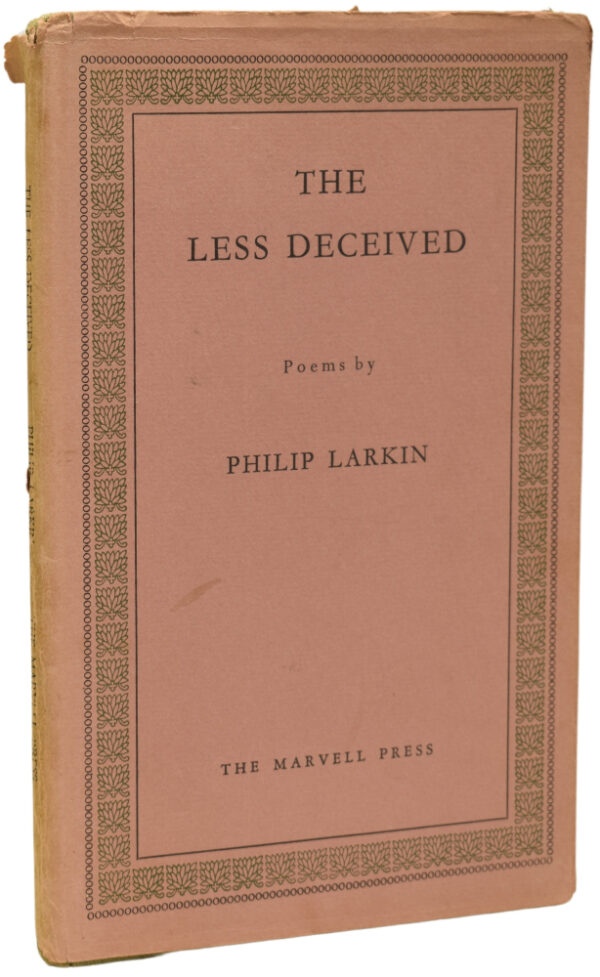
The Less Deceived. Poems
LARKIN, Philip (1922-1985) [Poetry] FOURTH EDITION. Octavo (22 x 14cm), pp.45 [3]. With a publisher's slip loose to preliminaries. Publisher's green cloth with gilt titles to spine. With the pink typographic dust-jacket, priced at 10/6. Gently toned throughout, with a blue ink ownership to fly-leaf and a tobacco scent. Jacket sunned and rubbed to spine, with moderate wear and chipping to edges. Very good. Larkin's superlative second poetry collection.- $47
- $47
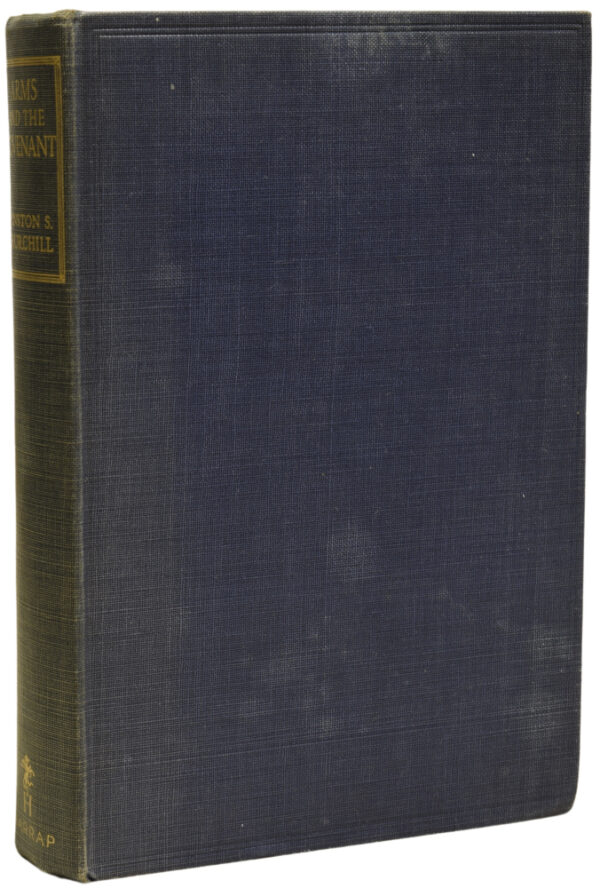
Arms and the Covenant. Speeches by the Right Hon. Winston S. Churchill, C.H, M.P., Compiled by Randolph S. Churchill
CHURCHILL, Winston S. (1874-1965) [Politics] FIRST EDITION, First Impression. Octavo (23 x 17cm), pp.466 [2]. With a frontispiece photograph of Winston Churchill. In publisher's blue cloth with gilt titles to spine. Top edge blue. One of just 5000 copies from the original print-run. Contents clean. First and final leaf of text block toned as usual, edges and covers lightly marked. Very good indeed. A volume of Churchill's speeches on National Defence and Foreign Affairs. The US version, entitled 'While England Slept' was published later in September 1938. Langworth p.192.- $394
- $394

Cannery Row
STEINBECK, John (1902-1968) [American literature] LEATHER-BOUND FIRST UK EDITION, first impression. Octavo (20 x 14cm), pp.136. Elegantly bound in navy blue half calf over the matching cloth boards, raised bands and gilt titles to spine. The pages show brightly bearing in mind they have been printed on war economy standard paper, some slight marking to the edges; externally fine. A clean copy in a handsome recent leather binding. The classic depression-era novella set in a run-down street of sardine canneries in Monterey, California, being a story of misfits, death and loneliness in the aftermath of World War II.- $234
- $234
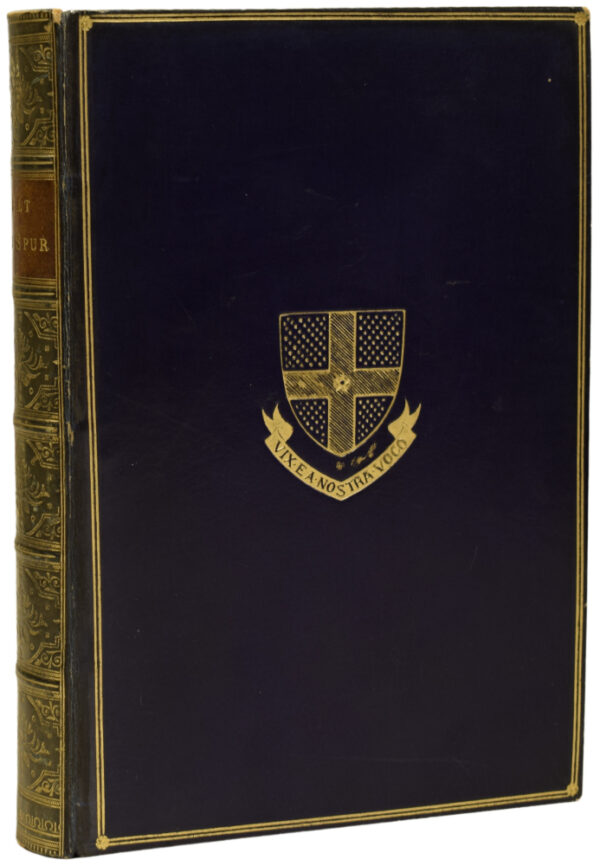
Belt and Spur. Stories of the Knights of the Middle Ages from the Old Chronicles
[SEELEY, Emma Louisa] [History] FIRST EDITION. Octavo (20 x 14cm), pp.[2]; xii; 298; [2]. Blue full calf, gilt tooling to boards and spine, lettered in gilt to spine, blind dentelles to turn-ins. Marbled endpapers and textblock edges, with sixteen illustrated colour plates including a frontispiece. Previous ownership inscription to front blank in black ink dated 1885, spotting to preliminaries and endpapers, toning to spine, some light bumping to lower board. Very good. This book is a guide to the knights of the Middle ages and they 'are told as the chronicler tells them; sometimes in an abridged and condensed form, but as far as possible, in the spirit and style of the original'. Some of the knights covered in this book are King William the Lion, King Henry V, Prince Edward. The illustrated plates are mainly adapted from the illuminated manuscripts in the British Museum.- $87
- $87
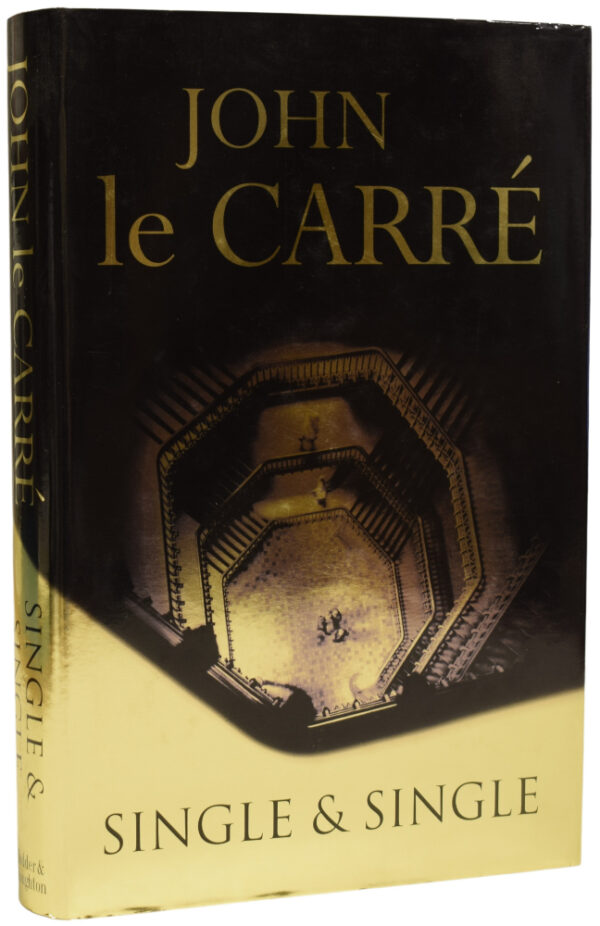
Single and Single
LE CARRÉ, John [pseudonym of David John Moore CORNWELL] (1931-2020) [Legal thriller] SIGNED FIRST EDITION, first impression. Octavo (24 x 17cm), pp.336. SIGNED by the author in black ink to title page. Publisher's burgundy cloth, with gilt titles to spine and yellow endpapers. With the pictorial dust-jacket, priced at £16.99. A crisp, clean copy showing just a few minor bumps and marks. Near fine. Following his Cold War espionage novels, John Le Carré now switches to the post-Soviet Union environment without missing a beat, and in the slick, action-packed 'Single and Single' we have an intriguing delve into the apparently legitimate banking of the West and its ties to the criminal elements of the former Soviet bloc.- $87
- $87
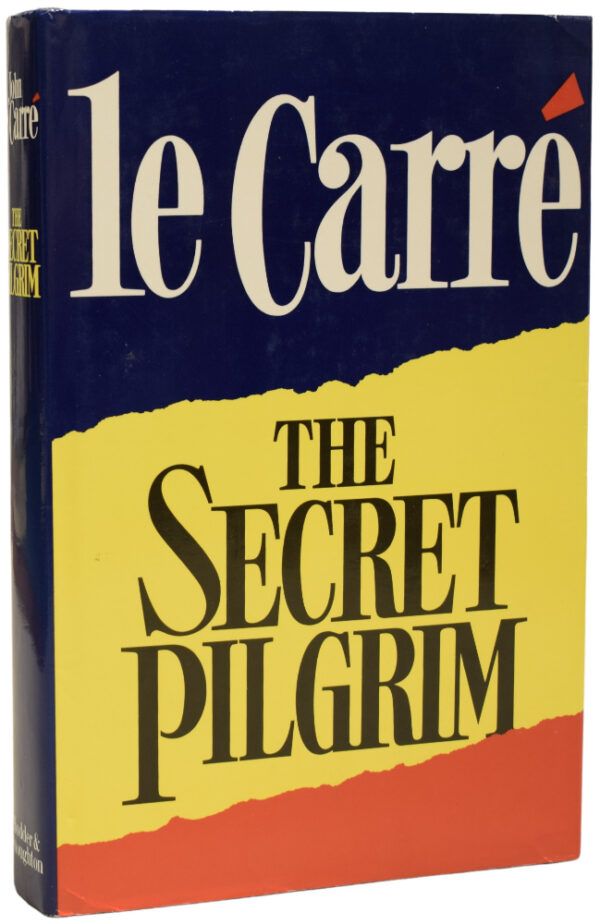
The Secret Pilgrim
LE CARRÉ, John [pseudonym of David John Moore CORNWELL] (1931-2020) [Spy thriller] SIGNED FIRST EDITION, first impression. Octavo (24 x 16cm), pp.[8] 335 [9]. SIGNED by the author in black ink to the title page. Publisher's purple cloth with gilt titles to spine and blue endpapers. With the blue, yellow and red dust-jacket, priced at £14.95. A crisp, fine copy. An espionage novel with George Smiley in a supporting role.- $194
- $194
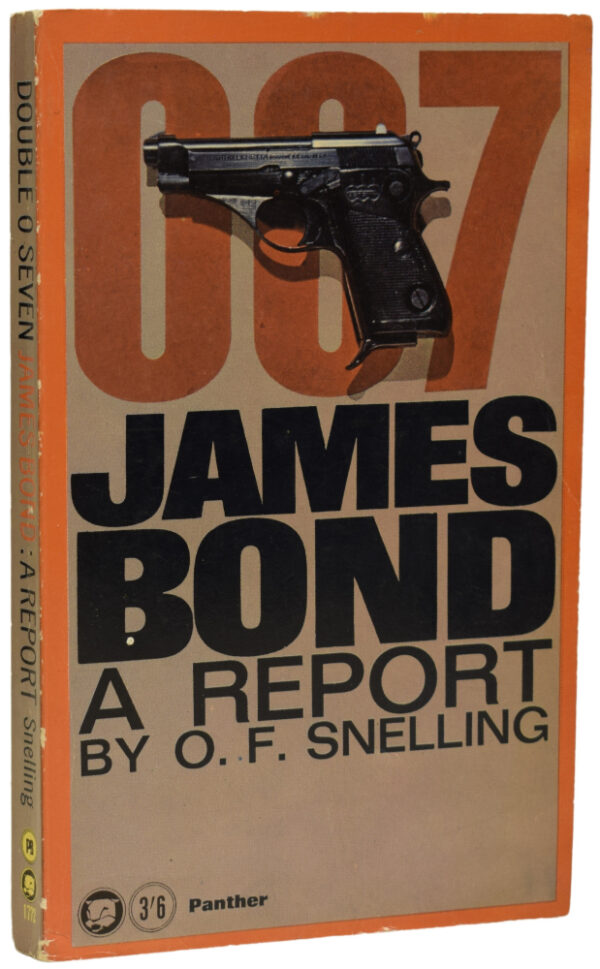
Double O Seven. James Bond. A Report
SNELLING, O.F. (1916-2001), [FLEMING Ian] [Reference/ Literary criticism] FIRST PAPERBACK EDITION. Author Peter Haining's copy. Pp.192. Publisher's illustrated softcovers priced at 3/6. Usual page toning, gentle spine roll, and a few minor rubs. Near fine. This copy belonged to author Peter Haining (1940-2008) who wrote the reference book James Bond: A Celebration (1987). With accompanying paperwork/provenance. GILBERT, Jon. Ian Fleming: The Bibliography, p.610.- $60
- $60
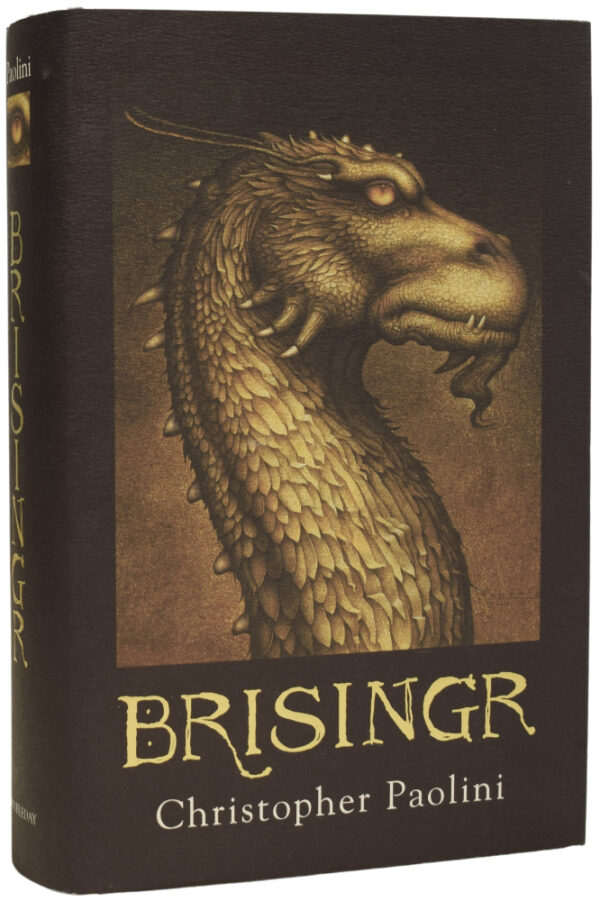
Brisingr
PAOLINI, Christopher (born 1983) [Children's Literature] FIRST EDITION, first impression. Octavo (24 x 17cm), pp.xix; [1]; 763; [1], blank. Publisher's black cloth lettered in gilt to spine, illustrative dust-jacket illustrated by John Jude Palencar with printed price of £16.99 to front-flap. Cartographic endpapers, map to p.i-ii, illustrated frontispiece. Rolling to crown of spine. Near fine. Brisingr is the third book in Paolini's 'The Inheritance Cycle'. In this novel, Eragon's magical powers are challenged. Eragon has made oaths to many people but keeping these promises is becoming increasingly difficult. In Paolini's gripping fantasy world, we follow Eragon across the Empire and watch the sacrifices he makes to save those around him.- $47
- $47
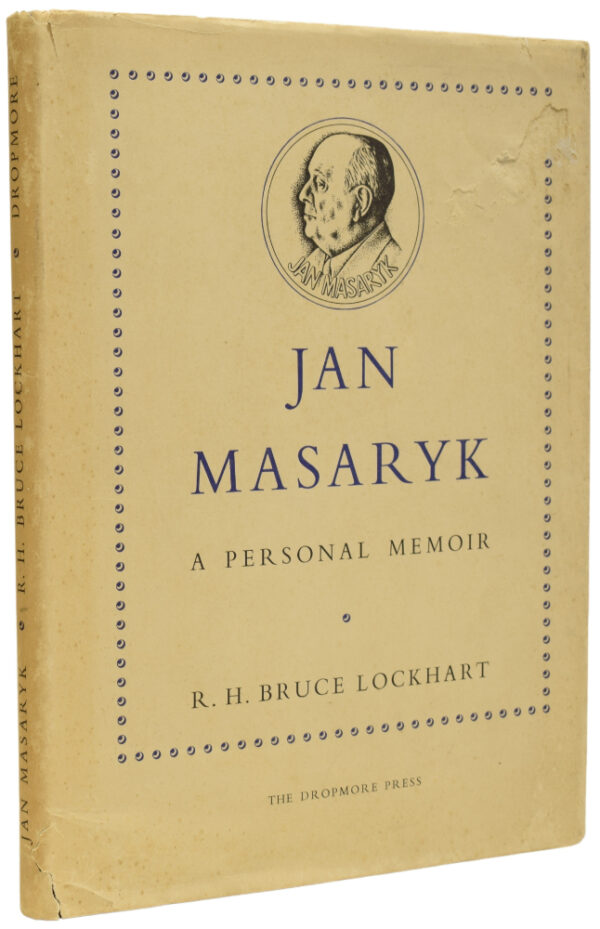
Jan Masaryk. A Personal Memoir
[Ian Fleming association] BRUCE LOCKHART, [Sir] R.H. [Military history /politics / espionage] LIMITED EDITION. One of five hundred copies. Quarto (27 x 20cm), pp.viii;80; [4], printed on hand-made cream wove paper, title and colophon printed in two colours. With fine colour illustration of the Masaryk Memorial Medal, 1948. Original full blue buckram, gilt, t.e.g., illustrated dust-wrapper priced £1, 10s, 0d. A stylish and expensive book for the time. Contents clean. A fine copy in near fine wrapper with small scuff to front panel. An elegant production from the publishing house run by Ian Fleming (renamed Queen Anne Press shortly after this release). Later owned by Fleming's bibliographer Jon Gilbert (also published by QAP). A record of their wartime friendship. Bruce Lockhart was a British diplomat, journalist, author, and secret agent. He was posted to Moscow with agent Sidney Reilly ('Ace of Spies'). His 1932 book Memoirs of a British Agent became an international best-seller, chronicling his experiences in Russia in 1918 following the Bolshevik Revolution. Masaryk was the Foreign Minister of the Czechoslovakian Government-in-exile who made regular BBC broadcasts from London to occupied Czechoslovakia. Masaryk's wartime speeches made him a national hero. Following liberation of his country, he remained Foreign Minister during the volatile immediate post-war years, with Czech communism on the rise, and the country's dealing of arms to Israel during the 1948 Arab-Israeli War. In March 1948 Masaryk was found dead in his pyjamas, having fallen from his balcony. The Ministry of the Interior claimed it was suicide but it was widely assumed he was murdered at the behest of the nascent Communist government. A 1968 investigation could not exclude murder, and an inquest following dissolution of Czechoslovakia concluded that he had been executed. Gilbert, pp.638, 663.- $201
- $201
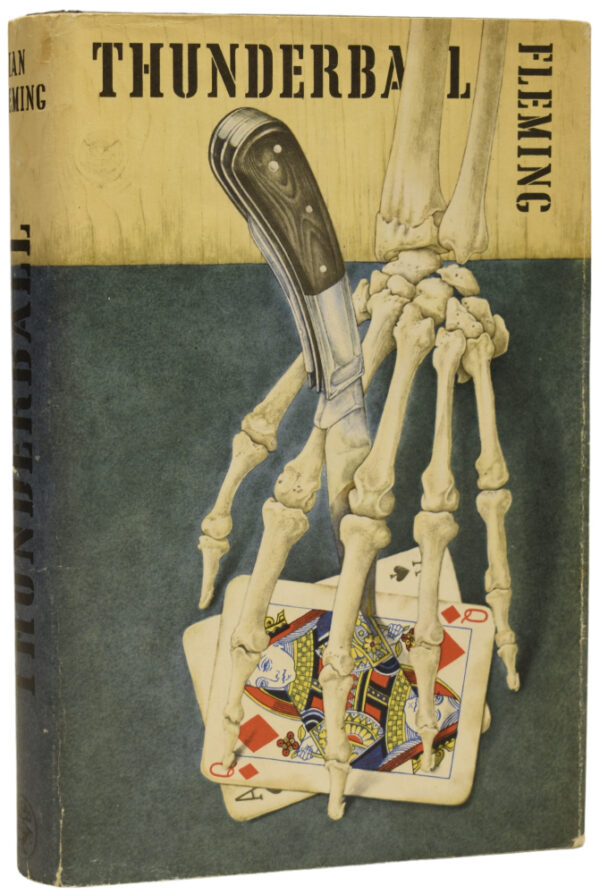
Thunderball
FLEMING, Ian Lancaster (1908-1964) [Spy thriller] FIRST EDITION, fifth impression, bibliographer's copy. Octavo (19 x 13cm), pp.254; [2], bank. Publisher's cloth-effect paper over boards with embossed skeleton hand design to upper board, gilt titles to spine, dust-wrapper illustrated by Richard Chopping priced at £4.95 via publisher's label. Ex-library copy with expected handling and wear, although quite presentable. Faint (partially erased) institutional stamp to copyright page else clean within, some splashing to foot of page edges, jacket with very little wear. Shows well. The majority of Cape's James Bond hardcover reprints were taken into the lending library system to replace existing well-worn stock. From the comprehensive James Bond collection assembled by Jon Gilbert (pencilled notes and signature within). His comprehensive guide to the works of Ian Fleming (2012) won the 16th Breslauer Prize for bibliography. Gilbert A9a (5).- $127
- $127
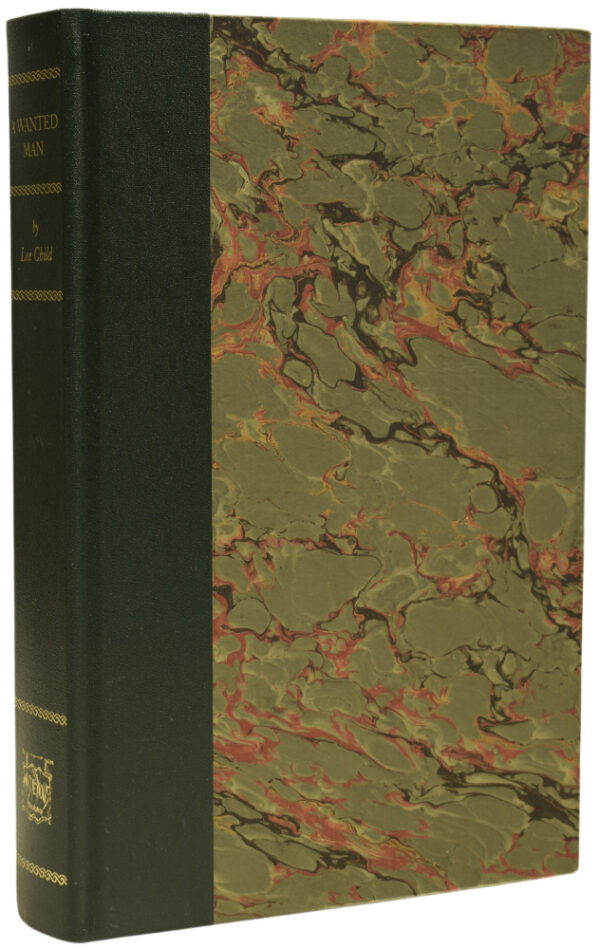
A Wanted Man. A Jack Reacher Novel
CHILD, Lee [pseudonym of GRANT, James Dover] (born 1954) [Thriller] SIGNED LIMITED EDITION. Octavo (24 x 16cm), pp.408. Number 25 of just 100 copies thus, SIGNED by the author in black ink to limitation page. Publisher's green quarter cloth, with gilt titles to spine and marbled paper over boards. Lilac endpapers. Smudge to fore-edge, either a production fault or transit mark. A fine, as-new copy. The seventeenth Jack Reacher novel. First published in 2012, this special edition contains a new introduction by the author. Lee Child has received multiple nominations for the prestigious Ian Fleming Steel Dagger, recognising best thriller of the year, and won the CWA's Diamond Dagger for a writer of outstanding body of crime fiction. Two blockbuster movies have been made from the Jack Reacher thrillers, plus the acclaimed Amazon Prime television series 'Reacher'.- $201
- $201
The Girls of Slender Means: https://rarebookinsider.com/rare-books/the-girls-of-slender-means/